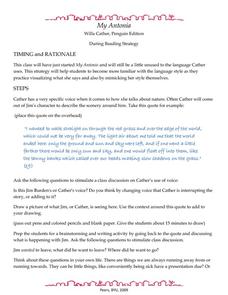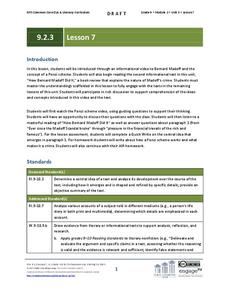Curated OER
Phonological Awareness, Phoneme Manipulating, Phoneme Position Sort
Scholars make new words out of old ones by manipulating phonemes. Pupils mix and match initial, medial, and final phonemes to change words like cap into cup or head into bed.
K12 Reader
What Happens Next?
While your students may not be psychics, that doesn't mean they can't predict what will happen next in a story. To hone this important reading comprehension skill, young learners read a series of three short...
Curated OER
My Antonia: During Reading Strategy
Home in on the quote on this page to explore setting, the author's and character's voices, and plot in Willa Cather's My Antonia. Pupils draw a picture of what is described in the quote, discuss the content, and make connections to their...
K12 Reader
Little Women: Helping Father
Jo's decision to sell her hair to bringing her wounded father home is a pivotal and poignant scene from Louisa May Alcott's Little Women. Class members read the excerpt and answer four questions about the details, vocabulary, and plot...
EngageNY
Grade 10 ELA Module 1: Unit 3, Lesson 1
The Joy Luck Club by Amy Tan is an illustrative source of rich prose, deep character development, and strong literary themes. Use two of the book's key chapters, which focus on Waverly's relationship with chess and with her mother, to...
EngageNY
Grade 10 ELA Module 1: Unit 2, Lesson 2
Class members continue their reading of Ethan Canin's "The Palace Thief," focusing on how the relationship between the narrator and Sedgewick changes after the narrator meets Sedgewick's father.
Curated OER
The Monster in the Barn
What could that scary sound be? Join Bobby and his dad in a search for a screeching monster with a short reading passage. In addition, learners show their understanding with a series of comprehension questions and a lesson extension.
EngageNY
Grade 9 ELA Module 2, Unit 3, Lesson 7
After viewing an informational video that introduces Bernard Madoff and the concept of a Ponzi scheme, class members begin reading "How Bernard Madoff Did It," Liaquat Ahamed's New York Times book review that explains Madoff's crime, and...
Newsela
Understanding "A Long Walk to Water"
What is the secret to success? Scholars use close reading of a variety of articles to determine characteristics of people that overcame hardships to become successful. While reading, pupils annotate their copies, make claims, and...
EngageNY
Grade 9 ELA Module 1, Unit 1, Lesson 12
Finding the central idea in a text can be as simple as deciphering the correct pieces of supporting evidence. As your class reads Stage 4 of "St. Lucy's Home for Girls Raised by Wolves" by Karen Russell, they analyze the interactions...
EngageNY
Grade 9 ELA Module 1, Unit 2, Lesson 8
What is the source and meaning of beauty? As part of their reading of David Mitchell's Black Swan Green, class members analyze Madame Crommelynck's conversation with Jason to determine how the conversation about beauty develops a central...
EngageNY
Grade 10 ELA Module 1: Unit 2, Lesson 9
Do our childhood circumstances significantly shape us? As the close reading of “The Palace Thief” continues, groups examine how the results of the first "Mr. Julius Caesar" competition influenced the development of the characters in...
Teach-nology
Being a Comedian Isn’t All Laughs
What's it like to be a comedian? Find out with a short cloze passage about the life of a comedian. Kids use eight words at the bottom of the page to fill in the blanks throughout the passage.
Curated OER
Animal Analogies
Worksheet is to helpful as grammar is to fun! Work on solving 18 analogies involving animals and their characteristics with an engaging grammar assignment.
Curated OER
Reading Blog Log
Bring technology to your novel unit with this lesson, which prompts readers to analyze a book they are reading in a Socratic discussion with their classmates. They create a live blog online in which they can give their opinions and...
Tennessee State Museum
Deciphering the Document: Unlocking the Meaning of the Emancipation Proclamation
Help your learners truly understand the Emancipation Proclamation by asking them the put it into their own words. After reading the document out loud to the class, and briefly discussing the legal language, split your class into small...
Recorded Books
Teacher's Guide: The Pinballs
Dive your class into the novel The Pinballs by Betsy Byars with the support of this reading guide. Including short answer questions, a multiple choice comprehension quiz, and extension activities, a variety of materials are...
K12 Reader
The Cat on the Mat
Everyone likes a poem about a cat, especially when it includes other rhyming words that end with -at! Kids read the lines and then respond to three reading comprehension questions.
K12 Reader
Kick the Brick
Your class won't say ICK when they see this worksheet that focuses on -ick words! Learners read a short and silly poem containing many -ick words. They then practice reading comprehension and handwriting by tracing the answers to the...
K12 Reader
Look at the Good Wood
Practice the oo digraph with a quick text and related questions. The short poem includes plenty of examples of the digraph. After reading, learners respond to the three reading comprehension questions.
K12 Reader
The Brown Cow in the Tower
Move toward mastery of -ow words with a quick worksheet. Learners read a poem that includes as many -ow words as possible and then respond to three included reading comprehension questions.
K12 Reader
Hide and Seek
Why do certain animals look the way they do? It could be because they have developed camouflage. Kids can read up on camouflage and mimicry and then respond to five questions related to the content of the passage.
K12 Reader
The Great Depression
Try out this reading passage when teaching your class about the 1920s and 1930s. After reading the text, which provides an overview of some major events in these years, learners respond to five related questions.
K12 Reader
Transcontinental Railroad
Who built the Transcontinental Railroad and why was it important? Your class can learn about the laying down of these tracks by reading a short passage. Pupils then respond to five questions related to the text.























